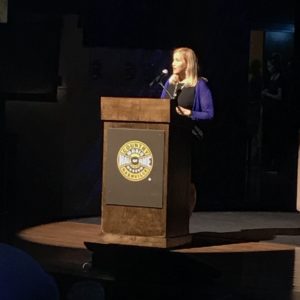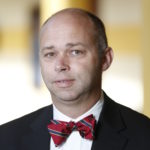By Kara Sherrer
From August 22 to 25, Health:Further became the latest health care conference to land at Music City Center — just don’t call it a conference. Health:Further bills itself as a “festival” and aims to become the South by Southwest of the health care world.
“We don’t want to be a conference. We won’t let anyone call it a conference. If you’re from the press, please don’t write about this as a conference,” CEO and founder Marcus Whitney exhorted the audience on the second day. “It’s a festival when people come together to celebrate…we’re here to celebrate a bright, bold, optimistic future of health.”
So, did Health:Further 2017 succeed — and why does it matter to the Owen community, anyways? First of all, the Center for Health Care Market Innovation (CHMI) at Vanderbilt Business was a major sponsor of the event. In addition, Professor Larry Van Horn, founding director of CHMI, spoke at the festival several times and personally coordinated much of the other programming.
“The role of the Center is to craft the vision for the various days,” he explained. “(Health:Further), to me, is not about how health care is delivered today…it’s much more around where will the future go.”
Van Horn was just one of many Owen connections who spoke at the festival. Nashville Mayor Megan Barry (MBA’93) gave the opening remarks, reaffirming Health:Further’s two ideals: that health is a human right, and that it must be supported affordably and sustainably.

Nashville Mayor Megan Barry (MBA’93) gives her opening remarks
“We have a paradox about accessibility (to health care),” she said. “It’s important that we have the entrepreneurs, the innovators, the disruptors, the providers, the payors, and the policymakers all in the same place, so that you all can come up with solutions to our health care challenges.”
Numerous Owen graduates gave solo talks and participated in panels throughout the festival, including John Ingram (MBA ’86), Vic Gatto (MBA ’02), Hayley Hovious (MBA ’08), Travis Messina (MBA’08), and Mark Harris (MBA’11). Gatto is the founder of Jumpstart Foundry, which is owned by the same parent company as Health:Further and helped sponsor the fourth day of the festival, which centered on investment topics.
“The only way to solve the challenges that we have…is to find new innovations, new technology, new ways to engage people in their health,” Gatto said. “We use our technology and behavior modification to sell things on TV…I want to take those same advertising-based techniques and teach people to take care of themselves better.”
Naturally, innovation was a major theme of Health:Further 2017 (and of course a major reason why CHMI became a sponsor this year). These innovations came from organizations of all sizes, from small startups to big institutions like HCA, Blue Cross Blue Shield, the FDA, the Department of Health and Human Services, Center for Medicare and Medicaid, and Planned Parenthood.
Attendees looked to companies from non-health-care-related industries for insight, such as Procter & Gamble, Atlanta Hawks, the Nashville Predators, Adobe, Salesforce, Samsung, and Forbes Travel Guide. Greg Glassman, the founder of CrossFit, spoke memorably about broader wellness topics, and attendees heard from other celebrities such as television personality Dr. Oz and NBA Hall of Famer Dominique Wilkins.
“This event is not just about health care,” said Health:Further founder Marcus Whitney. “We want to make sure this is about health, the core of what health care is really about.”
This year, the event expanded from 1.5 days to 3.5 days, and the numbers show it: four stages, 185 presenters, dozens of exhibitions booths. If each stage was a firehose, attendees were trying to drink from three or four at a time.

Professor Larry Van Horn
“I think we need to be more cognizant of giving people time to engage in the business meetings, the networking, the conversations, outside of the programming here,” Van Horn said. “(Next year,) we would probably re-orient the programming, cut it back in terms of the length of the day, and allow more time in the afternoons and evenings.”
In some ways, the festival agenda didn’t seem all too different from a conference, at least on paper. But walk into the hall, and it quickly became apparent that Health:Further is not your typical conference.
The event featured four stages set up in one large concrete hall to mimic the simultaneous performances at a music festival. Stop by any stage, and you’d be able to hear the other presenters, including a rotating cast of singer-songwriters who played throughout the event. The set up was designed specifically to create an energetic ambience and increase opportunities for mingling in the commons areas.
“We wanted there to be a lot of sound bouncing off the walls and for people to be like ‘Man, it’s so much energy going on,’ (and there was),” Whitney explained.
“Having the multiples stages and all the exhibitors (in one room) has this energy to it,” Van Horn agreed. “(But) the acoustics are tough, and there’s some challenges that we’ll want to address in the future.”
“There’s no excuse to have bad sound in Nashville,” agreed Tatum Allsep, another Vanderbilt alum (BS’93) and founder of Music Health Alliance, who helped coordinate the daytime performances as well as the Delbert McClinton concert; she also arranged singer Brenda Lee’s talk. Music Health Alliance is a patient advocacy group that helps connect musicians with poor or no health insurance to health care resources.
We all know music heals…why would we not include music in an event about health? -Marcus Whitney
Since health care is the single greater employer in Nashville, and the music industry is the second, the festival re-branding seemed natural to organizers.
“Nashville is this really unique place, because we’re a health care city, and we’re Music City. And that means we can have a festival,” Whitney said. “But healthcare events don’t ever include music. We all know music heals…why would we not include music in an event about health?”
While the organizers will certainly draw some lessons from this year, the event still made great strides in executing on its new vision, especially in terms of incorporating music and creating a festival-like atmosphere. No longer is Health:Further a series of breakout sessions sprinkled across conference rooms.
“I think the potential (for the festival format) is immense,” Allsep said. “There is no other city in the United States that could pull it off.”
Van Horn agrees that the event is on a good trajectory for many festivals to come.
“The vision that we’ve talked about is building South by Southwest for health care in Nashville… (and) being the anti-conference conference,” Van Horn said. “We’re really trying to generate an energy that is unique, and I think we’re on a path.”
About Vanderbilt’s Center for Healthcare Market Innovation
The Center for Health Care Market Innovation at Vanderbilt’s Owen Graduate School of Management is a hub for the evolution of health care markets. It conducts research on the demand for health care, how it is changing, and the capacity for new financing and delivery models to successfully meet changing consumer needs.
About Health:Further
Health:Further is an open community dedicated to the pursuit of two ideals: first, that health is a human right, and second, that health must be supported affordably and sustainably. Health:Further hosts an annual festival in Nashville, the center of health care in the United States.